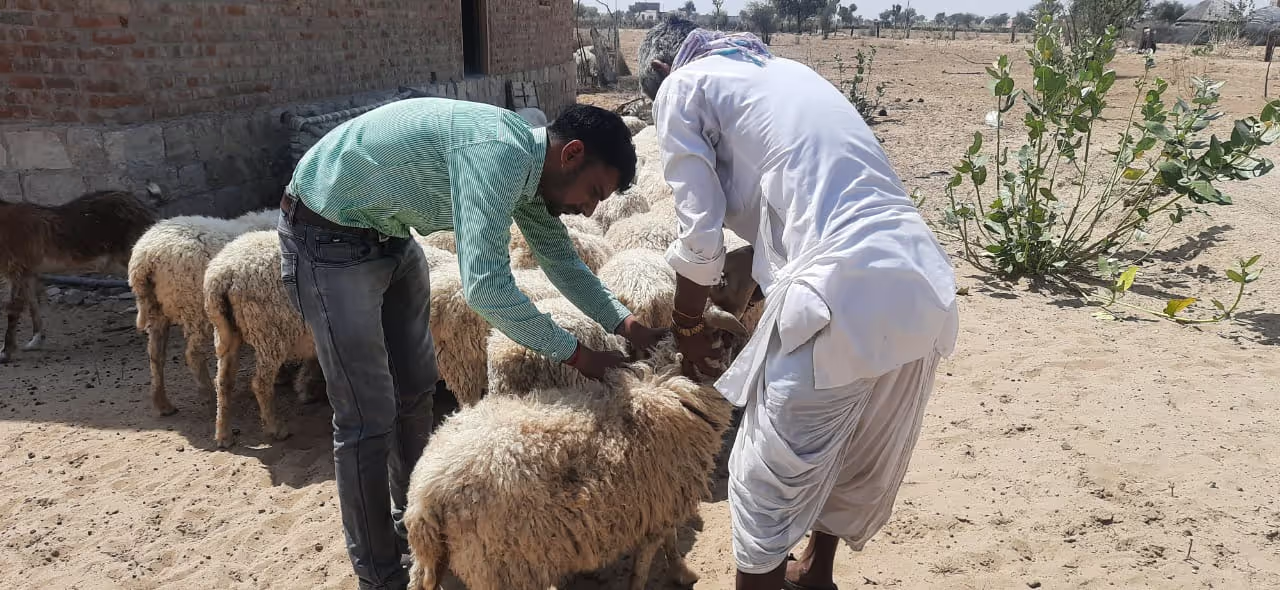Pashupalan Suvidha Kendra for Migrating Pastoralists in Jodhpur

Project overview
Privately-managed Common Facility Centres (CFCs) provide a package of basic support services for transhumant pastoralists in two villages of Jodhpur district in western Rajasthan, India, increasing their resilience to climate and economic shocks.
Project solution
This project offers [specific solution or intervention] to tackle [challenge]. By implementing [strategies, tools, or innovations], the project aims to achieve [desired outcomes]. The approach is designed to [specific actions or methods] to bring about meaningful change in [community, region, or issue area].
Expected outcomes
This project aims to achieve [specific outcomes], such as [measurable results, improvements, or changes]. The expected impact includes [benefits to the target community, advancements in research or innovation, or long-term effects]. By the end of the project, we anticipate [specific changes or milestones] that will contribute to [broader goals or objectives].
WHAT HUMANITARIAN NEED IS BEING ADDRESSED?
Migrating pastoralists in Jodhpur are exposed to extreme climate variability when growth of green forage resources, availability of water, livestock health and pastoral markets are adversely impacted. Common Facility Centres (CFCs) ensure preparedness to extreme climate variability by enhancing access to food, water and healthcare services for migrating herds. By addressing these pain points, pastoralists are able to maintain their herding and trade practices even during climate emergencies, boosting survival for herds and livelihood safety for herders despite a steadily increasing frequency of heat and cold waves in the desert regions of Rajasthan.
WHAT IS THE INNOVATIVE SOLUTION AND HOW WILL IT IMPROVE EXISTING HUMANITARIAN PRACTICE?
Dry fodder, drinking water and vaccines are increasingly hard to find along pastoral migration routes during climate emergencies due to poor accessibility and inflated prices, making migration a liability. CFCs with water, fodder and heath services for herds and resting and trade opportunities for herders allow long-range pastoralism to continue despite environmental and market shocks. Existing markets and facilities for herders are not integrated with the modern cash economy, leaving them outdated, marginalised and less equipped to deal with increasing external pressures such as heat and cold waves. CFCs provide the space for responding to the needs of pastoralists and herds through water reservoirs, fodder plantations, vaccination camps and business hubs for pastoral products (milk, dung, wool). It facilitates the growth of an inclusive rural economy that allows marginalised herder groups to continue their mobile livelihood practices despite unforeseen climate hurdles.
EXPECTED OUTCOMES
1) Improving access to basic support services and infrastructure for transhumant pastoralists and their migrating livestock animals along the pastoral routes
- Construction of CFC buildings, water reservoirs and installation of fodder growing machines
- Arrangement of vaccines through health camps for migrating herds
- Plantation of native fodder
2) Increased resilience and livelihood security of agro-pastoralists through integration of value chains for livestock and farm products
- Training of mini-CFC owners on management of CFC services
- Market integration of fodder and wool, milk and dung from migrating livestock
3) Improving policy atmosphere for transhumant pastoralists through knowledge synthesis and outreach and advocacy of evidence-based policy suggestions
- End-term impact evaluation and AV documentation of innovation
- Mega workshop with policy stakeholders for scaling up pilot CFCs for climate resilience
- Media stories and research articles on pastoral ecosystems and climate risk Development of policy white paper
Project delivery & updates
Stay up to date with the latest developments from this project. Here, you will find details on what has been delivered, resources created, and regular updates as the project progresses. Access key documents, reports, and other materials to see how the project is making an impact.